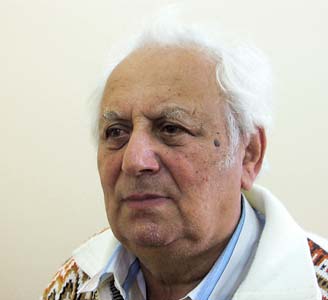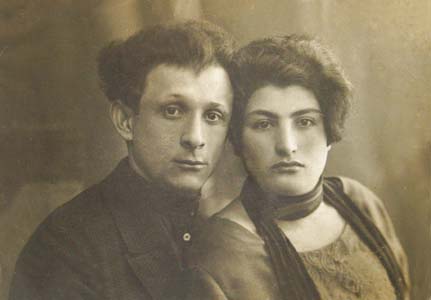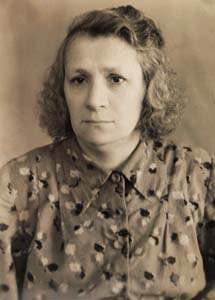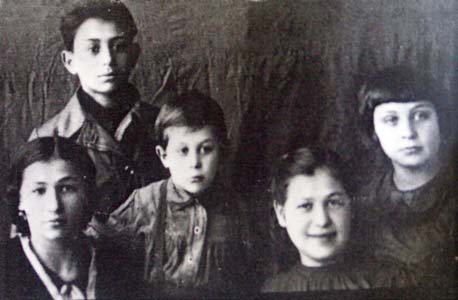Memories of Igor Abramovich Baranov
I met Igor Abramovich Baranov in Vitebsk charitable organization “Hasdei David”, which provides support to war veterans, former ghetto prisoners and handicapped people.
Igor Abramovich put his walking stick in the corner, took out photos out of his bag and we started talking.
 Igor Abramovich Baranov. 2007.
Igor Abramovich Baranov. 2007.
- I did not get to sleep at night. As soon as I closed my eyes, I saw the ghetto, - he said.
- How old were you back then? – I ask.
- I was born in Vitebsk in 1931. My father’s name was Abram Shmuilovich and he was a factory worker. Mother, Lia Izrailevna, worked as a shop assistant.
We lived in Vitebsk until 1941. I finished two grades at school. On July 4th, 1941 father went to work and was given a call-up paper to the military registration office. He came back home to say goodbye to us, took off his hat and put it onto my head. He left and we never saw him again.
We wanted to evacuate, so my mother, sister (Pasha Abramovna Baranova, born in 1935) and I headed for the railway station. My grandmother, cousin, father’s aunt also went with us. All in all there were eight people. When we were at the station we overheard conversations that the war would soon end and believed that. That was why we turned back and stayed in Vitebsk. Very soon we realized that information was wrong. Many families who believed that and stayed were killed.
On July 7th or 8th we made a decision to leave Vitebsk. This time we walked. The city was on fire, buildings were falling, and public transport did not function any longer. The shops were open but the shop assistants had left. People were scattering in different directions. The city was in panic.
We decided to walk towards Usviaty. Why did we choose that place specifically? My aunt’s husband, Haim Mikhailovich Sandler was a director at a factory. His parents lived in Usviaty. He was an educated and competent person; everyone in the family trusted his opinion. He asserted that the war would be short, the Germans would soon be defeated (everyone seemed sure about that) and we needed to move to Usviaty temporarily until the war was over. “They cannot get us in Usviaty, - he used to say. – the Germans are not interested in small towns and villages.”
So we walked and Sandler followed us. I think it took us three days to get to Haim’s parents. As soon as we got there he immediately wantd to go back to Vitebsk – he was a factory director and he had no right to leave the city. He was a very responsible man. Despite being told that everyone had left Vitebsk he made up his mind to go back. He left Usviaty but had to return – all the roads were blocked by fascists.
Our plan was to leave Usviaty and move eastwards after getting some rest. However, on July 13th, 1941, I clearly remember that day - we were sitting by the window and suddenly saw two armored cars with Germans – they occupied the village. We had to stay in Usviaty.
 Abram and Lia Baranov.
Abram and Lia Baranov.
We lived with Haim Sandler’s parents – they had their own house. His mother’s name was Hana, father’s – Mikhail. Eight people from Vitebsk lived in that house.
Soon a ghetto was established. There is a lake on the outskirts of Usviaty. There are four streets there: Malaya Naberezhnaya, Gorky, Gvardeiskaya and 25 let Oktiabria. They form a square. The Russians living there had to move out, while we were made to settle in their houses. Then we were made to fence the ghetto with barbed wire.
We were not given any food. The Sandlers had some reserves but they quickly ran out. We were exchanging clothes for food or begged the locals to give us some food.
The Germans came to the ghetto to rob and take things that attracted their attention.
I remember there was a Jewish woman from Minsk in the ghetto, a blacksmith and his wife. When the ghetto was being established they decided to hide in the forest. After spending days wandering, living in the woods and vain hopes to find shelter they had nothing left to do but come back to Usviaty. It was a Sunday. They were taken to a field. The woman’s son said to a policeman: “Please, don’t kill me.” The man just hit the boy on the stomach with his boot as hard as he could. Then he shot the woman herself and the blacksmith with his wife. The blacksmith’s kids were saved by a Russian woman. They lived in Leningrad after the war.
 Aunt Eva Sandler.
Aunt Eva Sandler.
The following day a 75-year-old Jewish man also came back to the village and nobody gave him away. So he survived.
The Germans frequently organized demonstrative executions to keep the people in constant fear.
Jews had to wear a white stripe with a yellow Magen David on their sleeves. Everyone from the age of 13 had to have one. They threatened to murder everyone who would be seen without it.
Adults: mother, aunt Eva (Haim Sandler’s wife), grandmother Sora were made to work for the Germans. The ghetto residents usually were forced to perform useless exhausting work. For instance, they had to carry logs from one place to another. They cleaned streets. Mother said she was made to carry logs which a healthy man would not lift.
We had no firewood in the ghetto – the winter of 1941 was severe, the temperatures reached minus 35 degrees. The ghetto residents made firewood, but only the Germans could use it. Once, we could not stand it any more. My sister and I left the ghetto and walked to the apartment where the Sandlers used to live. We intended to get some firewood. There we saw a German.
- Jude? – he asked.
My sister ran away and I stayed. The German approached me and hit me on the back with a boot. I did not feel any pain at first but then could not walk for two weeks.
We had our photo album that we had brought from Vitebsk. Once, when the Germans came to rob us they came across it, saw my father in the military uniform and asked: “Is he a partisan?” It took us a while to explain to him that it was a pre-war photo and that my father was in no way related to the partisans. We hid all our albums under the house after that incident. Unfortunately we could not find them later.
Haim Mikhailovich Sandler was a communist; they say he also had connections with the local partisans.
On Novermber 6th or 7th, 1941 he and three other men were taken to work, never to come back again. They were shot by the commandant’s office. Someone had informed the Germans those people were communists.
There was another communist in the ghetto, Baskin. His wife was Russian. When the Germans came he hid in the forest. They say he killed a German soldier there. His wife was pregnant and left to stay with her mother. Every once in a while Baskin came to see her and the local policemen found that out. He was caught and beaten black and white. They tortured him trying to find out who had been concealing him. He did not utter a word. He was hanged on November 7th, 1941.
On November 9th, 1941, no one was taken to work. At once we realized we were going to be executed. A German punitive squad arrived. The Germans set machine guns in the corners of the ghetto. Our house was located by the ghetto gates, by the lake. The policemen stood at the gates and did not let anyone out.
 The Baranov family.
The Baranov family.
We were all taken to a field. They ordered men and women to stand separately. I looked older than my age and was going to join the men but my mom took me by the hand and said: “If it is our fate, let them shoot us together.”
Men and young women without children were left on the field while the rest were taken back to the ghetto. The men were shot. The documents state that 34 people were murdered on that day, but I consider there were more.
Baskin’s relatives did not come to the field. The commandant called my mother and told her: “Go get them”. Mother had nothing to do but run. Another German saw her running and thought she was trying to escape. He shot and missed. The commandant then told him it was his order.
Mother called the Baskins to the field. The women were killed at once, Baskin’s father was wounded. He was shouting: “Jews, save me!” But everyone was too scared to help. A policeman finally came up to him and shot him.
The old people and women were ordered to dig the ground (which was frozen) and bury the bodies. In spring the lake always rose and the water reached that place where the Germans ordered to make the mass grave. Usviaty residents used the lake water for cooking and other purposes, so they started shouting. The Germans realized it could invoke epidemic, so they ordered to gather the old people and women once again and open the graves. The frozen grave was re-opened and the remains reburied. Policemen brought horses, loaded the corpses into the carts, like rails, and transported them to the Jewish cemetery.
The corpses were not decomposed yet due to the frost. So when they were brought to the cemetery, the victims’ relatives brought white shrouds to wrap the bodies into. It was a bright sunny day and the dead were lying as if they had fallen asleep. The wind moved their hair. It was an awful sight.
There was a Jewish woman from Vitebsk in our ghetto. She had two kids aged 15 and 10. The 15-year-old was on a field and the 10-year-old hid under a stove. The elder son was shot, so his mother dashed back to save the younger one. The younger boy got scared and ran out of the house. That very moment a German was passing the house and shot the boy.
Another Jewish woman had a goat. Her Russian neighbor was brave enough to come to the ghetto, even though it was strictly forbidden, and said: “Hana, give me your goat. You will be shot tomorrow”. Hana replied: “You will take it after we are shot”.
On January 28th, 1942, we were still expecting death. Suddenly we heard a knock on the door. We were certain there would be policemen or Germans. Hana Sandler went to open the door. Then we heard her shouting. She ran in: “It’s our soldiers!” Would you believe it? We could not believe, either. Then we found out that Usviaty had been attacked by a group of Soviet soldiers and the Germans ran away. Only two Germans were left – they were spending a night with prostitutes. The neighbors showed where they were and the “amative” Germans were shot.
The soldiers spent the night in the village. Some of them stayed in our house as well. We gave them our bed and slept on the floor. Right by our house there was an army cookhouse and we were fed.
This is how we lived until March 14th, 1942. The front line was 1.5 kilometers away from our house and there were rumors that Germans could invade Usviaty again. Therefore an order was issued to evacuate everyone. On that day we were driven to a village. I can still remember that evening really well. It was very frosty even though it was springtime. The moon was really bright.
The about twenty people, including our family, walked eastwards. At some point we were stopped and checked. Then we went to Bashkiria.
In 1944, when Smolensk was liberated, we came back. We lived in Pochinka, worked on a collective farm and then returned to Vitebsk in August, 1944. I studied at school and later worked in a shoe factory.
Two memorials were set up in Usviaty to the Jews executed by fascists: one - in the ghetto itself and the other – in the Jewish cemetery.
At the end of our conversation Igor Abramovich told me another story, both funny and hortative:
- When I was born my parents named me Israel. But in 1986 my daughter asked me to change my name. She said she would not be able to enter a university with such a patronymic. What could I do? I changed my name and became Igor. Then my daughter moved to Israel at the beginning of the 90s. Now she is writing that she is not considered Jewish because she does not have the original documents with her first patronymic. She only has the documents with the new name. So, now I have to go to different institutions and collect papers to prove that I once was Israel to send them to the country with the same name.
|

